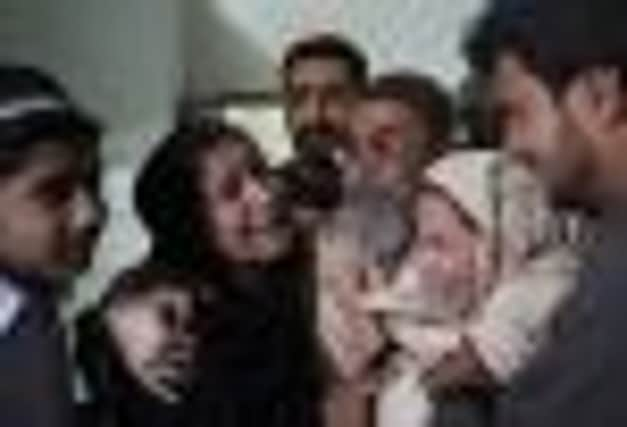Five women killed in bid to halt polio vaccinations


It is a major setback for a campaign that international health officials consider vital to contain the crippling disease but which Taleban insurgents say is a cover for espionage.
Pakistan is one of only three countries where polio is endemic. Islamic militants, however, accuse health workers of acting as spies for the West and claim the vaccine makes children sterile. Taleban commanders in the troubled north-west tribal region have also said vaccinations can’t go forward until the US stops drone strikes in the country.
Advertisement
Hide AdAdvertisement
Hide AdInsurgent opposition to the campaign grew last year after it was revealed that a Pakistani doctor ran a fake vaccination programme to help the CIA track down al-Qaeda chief Osama bin Laden, who was hiding in the town of Abbottabad. The Taleban have targeted previous anti-polio campaigns, but this has been a particularly deadly week. The government was in the middle of a three-day vaccination drive targeting high risk areas of the country as part of an effort to immunise millions of children under the age of five.
The women who were killed yesterday – three of whom were teenagers – were all shot in the head at close range. Four were gunned down in Karachi – Pakistan’s biggest city of 18 million people – and the fifth was killed in a village outside the north-western city of Peshawar.
The co-ordinated attacks in Karachi occurred within 15 minutes in three areas of the city that are far apart, said police spokesman Imran Shoukat. In each case, the gunmen used 9mm pistols. Two were aged 18 and 19 and the other two women were in their 40s.
Two of the women were killed while in a house giving children polio drops. The other two were travelling between houses when they were attacked.
On Monday, a male volunteer working on the anti-polio campaign was gunned down in Karachi. Taleban militants also killed three soldiers in an ambush of an army convoy escorting a vaccination team in the north-west.
Officials in Karachi yesterday suspended the vaccination campaign in the city, said Sagheer Ahmed, the health minister for surrounding Sindh province. The campaign started on Monday and was supposed to run until today.
Immunisation was also suspended in Karachi in July after a local volunteer was shot to death and two UN staff were wounded.
Janbaz Afridi, a senior health official in Khyber Pakhtunkhwa province, where the fifth woman was killed, said the shootings would not stop the vaccination programme in the province and the neighbouring tribal region, the main sanctuary for Taleban militants.
Advertisement
Hide AdAdvertisement
Hide Ad“These incidents are depressing and may cause difficulties in the anti-polio drive, but people should not lose heart,” he said. “The government is determined to eliminate polio, despite all odds and difficult conditions.”
The shootings in Karachi all took place in areas mainly populated by ethnic Pashtuns, said Mr Ahmed, the health minister. The Taleban are a Pashtun-dominated movement, and many militants are reported to be hiding in these communities in the city.
Rukhsana Bibi, whose 18-year-old daughter Madiha was killed in Karachi, seemed to blame the organisers of the vaccination campaign for her death.
“Why are you doing this by coming here?” said Ms Bibi, standing next to her daughter’s body at the hospital. “This is a prohibited area. Taleban are here.” Madiha was the only source of income for the family, which includes seven other children, said Ms Bibi, whose husband is too sick to work.
The woman who was killed in the north-west was also a teenager and was shot by gunmen on a motorcycle as she was working with her sister in the village of Shinkai Hindkian.
Polio usually infects children living in unsanitary conditions, attacks the nerves and can kill or paralyse. Most of the new cases in Pakistan are in the north-west, where the presence of militants makes it difficult to reach children. A total of 56 polio cases were reported in Pakistan during 2012, said Mr Ahmed.